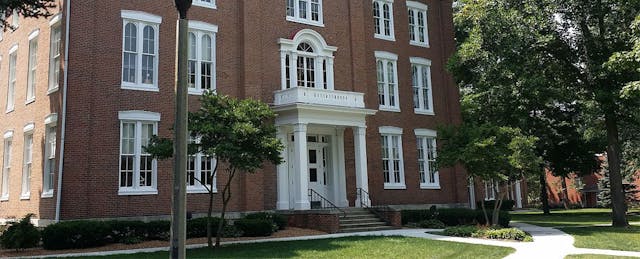When Nathan Schertz, a 21-year old student at Eureka College, hit some relationship troubles last year that distracted him from his studies, his grades slipped. And he found himself needing to make up credits fast to stay on track academically.
So the college offered him the chance to retake one of the course subjects online over the summer—even though Eureka doesn’t teach any online courses.
The offering was possible thanks to a new online course-sharing arrangement among members of the Council of Independent Colleges, a group of independent liberal arts colleges.
Most colleges in the group don’t have extensive online offerings, and the ones that do often have unfilled seats. The idea is that by banding together and sharing courses—and sharing tuition revenue when students take the courses—the colleges can improve retention by helping students fill gaps in their transcripts.
In the past, Eureka students looking to satisfy degree requirements would take in-person courses at area community colleges during the summer. But Ann Fulop, provost and dean of Eureka College, said that most of her students need to work over the summer to pay for college. So the online option lets them take courses at night and work during the day.
In a pilot phase of the course-sharing program last summer, 47 students enrolled in an online course through the consortium. Fulop said the majority of those students are now back on track academically, and the college considers the experiment a success.
To manage the arrangement, the Council of Independent Colleges turned to a company called College Consortium, which handles the financial details of the tuition-sharing and runs an online portal that lets professors and college officials look through other course offerings and decide which ones to accept.
College Consortium’s name is somewhat misleading; the organization is a for-profit company, rather than a consortium, and takes twenty-five percent of the course tuition through the arrangement.
“In most consortia there’s not a lot of activity going on because the logistics of academic sharing are difficult,” argues Robert Manzer, chief academic officer and co-founder of College Consortium. “Our platform makes it super easy to request a course at another institution.”
Fulop, of Eureka College, said the online directory of courses helped sell her faculty on doing online course sharing, since it allows them to look at details about each course—including the syllabus and even some “learning assessment data”—to decide case by case whether to accept them. “I have had faculty look at those syllabi and say this one’s not acceptable, this one’s acceptable,” Fulop said. “We’re telling the students, ‘that’s the course that belongs in our catalog because its most like ours.’”
Some research has shown that students don’t do as well in online courses as in in-person ones. So does Fulop worry about using online courses with students who have done poorly in traditional ones? “These students have already been through the course once, so these are repeats,” said Fulop.
For Schertz, the Eureka student, the new program let him take a management course online from William Peace University and an online American government class from Jacksonville College, in Texas. He had not heard of the colleges before, and he had to struggle to remember the name of one of them.
“I live on a farm, and we show animals and such, and this gave me the opportunity to work” while keeping up with class, he said.
Correction: This article originally misspelled the name of the provost at Eureka College.


